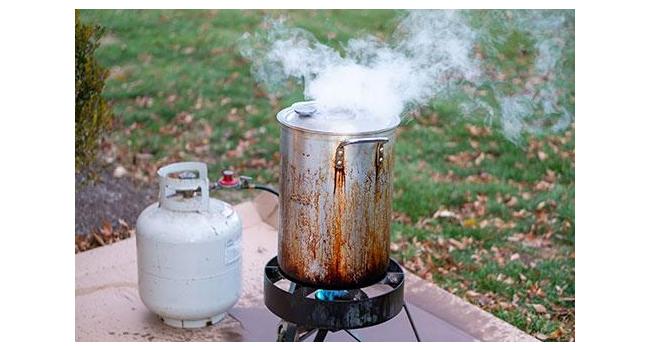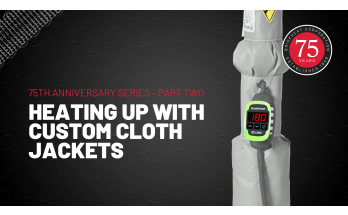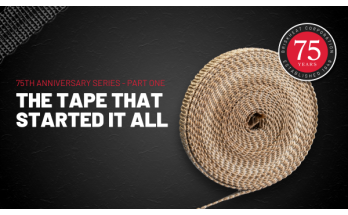Anyone who has ever deep fried a turkey knows the bird must be lowered very slowly into the oil. Moisture on the surface will start to boil immediately and can cause burns. What happens with a frozen turkey? If it’s still frozen, the ice becomes water and expands rapidly to steam. The boiling is so intense, oil, which is lighter than water, will spatter onto the hot surface of the burner, then ignited by the flame. This is a serious hazard to both persons and property as the fire can spread quickly.
Even with a fully defrosted turkey, ice can still cause problems when deep frying. Propane is stored in tanks under pressure as a liquid. When the valve is opened, a combination of decreased pressure and heat absorbed from the tank allow the liquid propane to convert to a gas. The gas is used for the fryer burner. Have you noticed frost forming on the outside of a propane tank? This occurs during the winter for a few reasons. Colder weather means there is less heat to assist in the conversion of the liquid to a gas. Additionally, there is less pressure, and therefore less flow. The conversion of the liquid to a gas cannot keep up with the demand of the burner, and therefore the cold is absorbed by the tank. Not only can the propane freeze, but the cold tank can freeze to surface on which it is resting.
This is exactly what happened on Thanksgiving morning. An annual fundraiser sells fried turkeys to support the Ohio State University Comprehensive Cancer Center including The James and Nationwide Children’s Hospital. This year it was cold and rainy when more than a dozen fryers were used to cook 400 turkeys. Newer burners use higher propane flows to heat the oil more quickly and tank levels need to be checked by lifting the tanks to check for remaining liquid. However, ice formed on the outside of the tanks and due to rain, the tanks froze to the payment. This not only made checking levels more difficult, but also meant sluggish flames as the tanks neared empty.
BriskHeat’s HotBelt Cylinder Jug Warmers offer a solution to these problems. Primarily designed to increase pressure on refrigerants used for filling refrigerators and freezers, these can also be used to prevent freezing of portable propane tanks. These warmers are designed to fit a variety of tank sizes from 9 to 13 inches (229 mm – 330 mm) diameter and are 6 inches (152 mm) wide. This includes the 20 lb. portable tanks used with fryers and grills. It features a built-in thermostat to maintain a surface temperature of 120°F (49°C). BriskHeat’s HotBelt is safe for outdoor use, exactly the environment for using fryers and grills. Whether it’s Thanksgiving, winter holidays or just a family gathering, don’t let a frozen propane tank ruin your cold-weather outdoor cooking.







